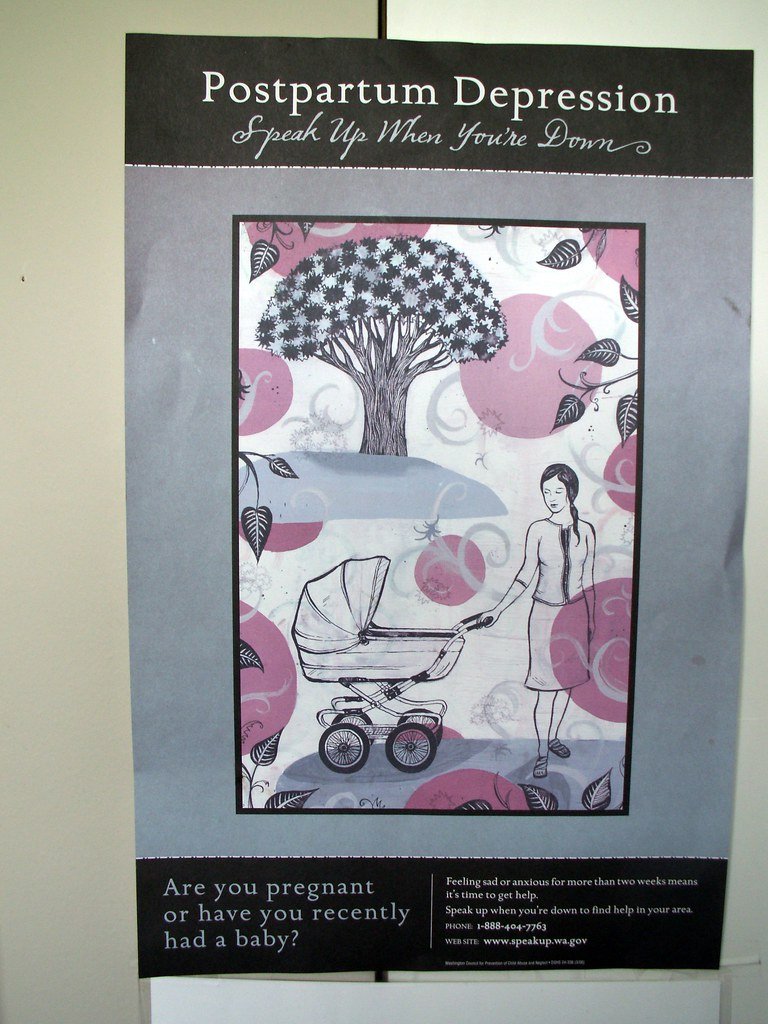Welcomed into the world with so much love and anticipation, the birth of a child is often regarded as a joyous occasion. But hidden beneath the surface of this extraordinary journey lies an emotional roller coaster that many new mothers face: postpartum depression. This silent intruder lurks in the shadows of what should be a blissful chapter, casting a dark cloud over a woman’s newfound motherhood. Unbeknownst to many, postpartum depression affects nearly 1 in 7 mothers, tarnishing the initial moments of bonding and nurturing with overwhelming feelings of sadness, anxiety, and self-doubt. However, armed with awareness and understanding, we can untangle the complexities of this condition and shed light on how to recognize and address postpartum depression, offering a beacon of hope amidst the storm.
Table of Contents
- Identifying the Warning Signs of Postpartum Depression
- Exploring the Underlying Causes and Risk Factors of Postpartum Depression
- Navigating the Support System: Seeking Help for Postpartum Depression
- Helping Loved Ones with Postpartum Depression: Practical Strategies for Support
- Embracing Self-Care: Promoting Recovery from Postpartum Depression
- Q&A
- In Conclusion

Identifying the Warning Signs of Postpartum Depression
Becoming a mother is often portrayed as a time of joy and happiness, but for some women, the reality can be quite different. Postpartum depression is a serious condition that affects many new mothers and can have a profound impact on their lives and the lives of those around them. It is essential to be aware of the warning signs and take action to ensure the well-being of both the mother and the baby.
There are various indicators that may suggest the presence of postpartum depression. Keep an eye out for any of the following warning signs:
- Intense feelings of sadness, emptiness, or hopelessness
- Severe mood swings, including irritability or anger
- Loss of interest in activities once enjoyed
- Trouble bonding with the baby
- Withdrawal from friends and family
- Changes in appetite or sleep patterns
- Constant fatigue or lack of energy
- Difficulty concentrating or making decisions
- Intense feelings of guilt or worthlessness
- Recurrent thoughts of self-harm or suicide
It is crucial not to ignore these warning signs and to seek help if you or someone you know is experiencing them. Postpartum depression is treatable, and early intervention can make a significant difference in a woman’s recovery. Reach out to healthcare professionals, support groups, or loved ones who can provide the necessary support and guidance during this challenging time.

Exploring the Underlying Causes and Risk Factors of Postpartum Depression
Postpartum depression is a complex and multifaceted condition that affects many new mothers. Understanding the underlying causes and risk factors is crucial in providing effective support and intervention for those experiencing this often overwhelming condition.
Biological Factors:
- Hormonal changes: Fluctuations in hormone levels after childbirth, particularly a significant drop in estrogen and progesterone, may contribute to the development of postpartum depression.
- Genetic predisposition: Some women may have a genetic susceptibility to developing depression, which can increase the risk of postpartum depression.
Psychological Factors:
- History of mental health issues: Women with a previous history of depression, anxiety, or other mental health disorders may be at a higher risk for postpartum depression.
- Stress and lack of support: The demands of motherhood, coupled with a lack of social support and increased stress, can contribute to the development of postpartum depression.
Social and Environmental Factors:
- Relationship difficulties: Strained or unsupportive relationships, including problems with a partner, family, or friends, can increase the likelihood of developing postpartum depression.
- Socioeconomic factors: Financial stress, limited access to healthcare resources, and societal pressures can all play a role in the occurrence of postpartum depression.

Navigating the Support System: Seeking Help for Postpartum Depression
Welcome to the post section on navigating the support system and seeking help for postpartum depression. As a mother going through this challenging phase, it is crucial to remember that you are not alone. The path to recovery may seem overwhelming, but with the right support and resources, you can regain your well-being and thrive as a new mom.
Here are some proactive steps you can take to navigate the support system:
- Recognize the signs: Understanding the common symptoms of postpartum depression is the first step towards seeking help. Watch out for persistent feelings of sadness, anxiety, or hopelessness, difficulty bonding with your baby, changes in appetite or sleep patterns, and a lack of interest in activities you once enjoyed.
- Reach out to loved ones: Don’t hesitate to confide in your partner, family, or close friends. Sharing your feelings and experiences with those who care about you can provide immense emotional support. Encourage them to educate themselves about postpartum depression so they can better understand what you’re going through.
- Consult healthcare professionals: Schedule an appointment with your healthcare provider as they play a vital role in diagnosing and treating postpartum depression. They can guide you through treatment options, such as therapy or medication, and connect you with local support groups or specialized therapists with experience in postpartum mental health.
- Join support groups: Connecting with other moms who have experienced postpartum depression can be a lifeline. Joining support groups, either in-person or online, provides an opportunity to share your journey, exchange coping strategies, and gain insight from others who can relate to your experiences. It’s a powerful reminder that you are not alone.
- Explore community resources: Research local organizations or nonprofits dedicated to supporting maternal mental health. Many areas offer postpartum depression helplines, counseling services, and workshops specifically designed to address the challenges new mothers face.
Remember, seeking help for postpartum depression is an act of strength and resilience. By actively engaging in the support system available to you, you are taking important steps towards healing and embracing the joys of motherhood.
Helping Loved Ones with Postpartum Depression: Practical Strategies for Support
When a loved one experiences postpartum depression, it can be overwhelming and confusing to know how to provide the right support. Here are some practical strategies to help you navigate this challenging time:
- Encourage open communication: Create a safe space for your loved one to express their feelings without judgment or criticism. Encourage them to talk openly about their emotions and concerns.
- Offer a listening ear: Sometimes, all that is needed is someone who is willing to listen. Be there to lend a compassionate ear and provide reassurance that they are not alone in their struggle.
- Educate yourself: Take the time to learn more about postpartum depression, its symptoms, and available treatments. This knowledge will help you better understand what your loved one is going through and how to support them.
- Assist with practical tasks: Offer to help with household chores, cooking, or running errands to alleviate some of the overwhelming responsibilities. Your support in these practical matters can make a significant difference.
- Encourage self-care: Remind your loved one about the importance of self-care and gently encourage them to take breaks, practice relaxation techniques, or engage in activities they enjoy. Taking care of themselves is crucial for their well-being and recovery.
- Offer to accompany them: Going to therapy appointments or seeking professional help can be intimidating. Offer to go with your loved one to provide moral support and to ensure they feel more at ease during these important steps.
Remember, postpartum depression is a treatable condition, and with your love, patience, and understanding, your loved one can overcome it. Your unwavering support can make all the difference in their healing journey.
Embracing Self-Care: Promoting Recovery from Postpartum Depression
Recovering from postpartum depression can be a challenging journey, but with the right self-care practices, it is possible to find healing and regain a sense of well-being. Here are some strategies to help you embrace self-care and promote your recovery:
- 1. Prioritize rest and sleep: As a new parent, it’s natural to feel overwhelmed and exhausted. Prioritizing rest and sleep is vital for your mental and physical well-being. Ensure you allocate time for naps, and try to establish a consistent sleep routine.
- 2. Nurture your body through nutrition: The food you consume can greatly impact your mood. Aim for a well-balanced diet that includes fresh fruits, vegetables, whole grains, and lean proteins. Additionally, stay hydrated by drinking plenty of water throughout the day.
- 3. Seek support from loved ones: Don’t hesitate to lean on your support system. Reach out to family and friends who can provide emotional support, lend a helping hand with household tasks, or even offer to babysit, allowing you some much-needed time for yourself.
- 4. Engage in gentle exercise: Incorporating gentle exercises, such as walking, yoga, or swimming, can have a positive impact on your mood and overall well-being. Start with short sessions and gradually increase the duration as you feel comfortable.
- 5. Practice mindfulness and relaxation techniques: Take time to engage in activities that promote relaxation and mindfulness. This can include meditation, deep breathing exercises, or indulging in a hobby you enjoy.
- 6. Consider therapy or support groups: Professional therapy or joining support groups specific to postpartum depression can provide a safe space to express your feelings, learn coping mechanisms, and connect with others who share similar experiences.
Remember, self-care is not selfish. It is a crucial element in your recovery journey. By incorporating these strategies into your routine and being kind to yourself, you are taking important steps towards embracing self-care and promoting your well-being.
Q&A
What is postpartum depression?
Postpartum depression is a debilitating mental illness that affects some women after giving birth. It is characterized by feelings of extreme sadness, anxiety, and exhaustion that persist beyond the typical “baby blues.”
How can I recognize postpartum depression?
Common signs of postpartum depression include persistent feelings of sadness or hopelessness, severe mood swings, loss of interest in activities, difficulty bonding with the baby, and changes in appetite and sleep patterns. If you experience these symptoms for longer than two weeks, it’s essential to seek help.
Who is at risk of developing postpartum depression?
While postpartum depression can affect any woman, some factors increase the risk, including a personal or family history of depression, stressful life events, lack of social support, and hormonal changes after childbirth. It’s important to be aware of these risk factors and monitor your mental health after giving birth.
What can I do if I suspect I have postpartum depression?
If you suspect you have postpartum depression, reach out to your healthcare provider immediately. They can provide a diagnosis and recommend appropriate treatment options such as therapy, support groups, or medication.
How can I help a loved one with postpartum depression?
Supporting a loved one with postpartum depression starts with open communication and empathy. Offer a listening ear, encourage them to seek professional help, and help with daily tasks. Remember to be patient and understanding as they navigate through this challenging time.
Is postpartum depression treatable?
Yes, postpartum depression is treatable with the right support and treatment plan. Therapy, medication, and lifestyle changes can help alleviate symptoms and improve the overall well-being of the mother.
What are some self-care practices that can help with postpartum depression?
Engaging in self-care activities such as getting enough rest, eating a balanced diet, exercising regularly, and finding time for hobbies and relaxation can significantly contribute to managing postpartum depression. Additionally, seeking emotional support from loved ones or joining support groups can provide a valuable outlet for sharing experiences and feelings.
In Conclusion
In conclusion, recognizing and addressing postpartum depression is a crucial step towards ensuring the well-being of new mothers and their families. By understanding the signs and symptoms, we can identify when someone might be struggling with this condition and offer them the support they need.
Remember, postpartum depression is not a reflection of weakness or inadequacy but rather a medical condition that requires proper treatment and care. As we have explored throughout this article, it is vital to encourage open conversations about postpartum depression and remove the stigma that often surrounds it.
Supporting new mothers during this challenging time involves offering them a safe space to express their feelings, validating their experiences, and helping them seek professional help when necessary. By providing a compassionate and understanding environment, we can create a community that listens, uplifts, and supports the journey of motherhood.
If you or someone you know is struggling with postpartum depression, do not hesitate to reach out for help. Remember that you are not alone, and there are numerous resources available to guide you through this journey. Together, we can empower women and pave the way for a healthier and happier postpartum experience.
Let us continue to educate ourselves and those around us about postpartum depression, empathize with new mothers, and advocate for their mental health. By doing so, we can contribute to a society that recognizes and addresses the challenges that come with motherhood, fostering a brighter and more nurturing future for all.
As an affiliate, my content may feature links to products I personally use and recommend. By taking action, like subscribing or making a purchase, you’ll be supporting my work and fueling my taco cravings at the same time. Win-win, right?
Want to read more? Check out our Affiliate Disclosure page.